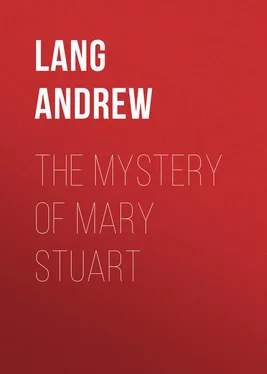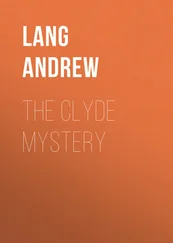Andrew Lang - The Mystery of Mary Stuart
Здесь есть возможность читать онлайн «Andrew Lang - The Mystery of Mary Stuart» — ознакомительный отрывок электронной книги совершенно бесплатно, а после прочтения отрывка купить полную версию. В некоторых случаях можно слушать аудио, скачать через торрент в формате fb2 и присутствует краткое содержание. Жанр: foreign_antique, foreign_prose, на английском языке. Описание произведения, (предисловие) а так же отзывы посетителей доступны на портале библиотеки ЛибКат.
- Название:The Mystery of Mary Stuart
- Автор:
- Жанр:
- Год:неизвестен
- ISBN:нет данных
- Рейтинг книги:4 / 5. Голосов: 1
-
Избранное:Добавить в избранное
- Отзывы:
-
Ваша оценка:
- 80
- 1
- 2
- 3
- 4
- 5
The Mystery of Mary Stuart: краткое содержание, описание и аннотация
Предлагаем к чтению аннотацию, описание, краткое содержание или предисловие (зависит от того, что написал сам автор книги «The Mystery of Mary Stuart»). Если вы не нашли необходимую информацию о книге — напишите в комментариях, мы постараемся отыскать её.
The Mystery of Mary Stuart — читать онлайн ознакомительный отрывок
Ниже представлен текст книги, разбитый по страницам. Система сохранения места последней прочитанной страницы, позволяет с удобством читать онлайн бесплатно книгу «The Mystery of Mary Stuart», без необходимости каждый раз заново искать на чём Вы остановились. Поставьте закладку, и сможете в любой момент перейти на страницу, на которой закончили чтение.
Интервал:
Закладка:
Whatever Mary’s feelings towards Darnley, when making an inventory of her jewels for bequests, in case she and her child both died, she left her husband a number of beautiful objects, including the red enamel ring with which he wedded her. [61] See Joseph Robertson’s Inventories , 112.
Whatever her feelings towards Moray, she lodged him and Argyll in the Castle during her labour: ‘Huntly and Bothwell would also have lodged there, but were refused.’ [62] Bain, ii. 283.
Sir James Melville (writing in old age) declares that Huntly and Lesley, Bishop of Ross, ‘envied the favour that the Queen showed unto the Earl of Moray,’ and wished her to ‘put him in ward,’ as dangerous. Melville dissuaded Mary from this course, and she admitted Moray to the Castle, while rejecting Huntly and Bothwell. [63] Melville, pp. 154, 155.
James VI. and I. was born on June 19. Killigrew carried Elizabeth’s congratulations, and found that Argyll, Moray, Mar, and Atholl were ‘linked together’ at Court. Bothwell had tried to prejudice Mary against Moray, as likely to ‘bring in Morton during her child-bed,’ but Bothwell had failed, and gone to the Border. ‘He would not gladly be in the danger of the four that lie in the Castle.’ Yet he was thought to be ‘more in credit’ with Mary than all the rest. If so, Mary certainly ‘dissembled her love,’ to the proverbial extent. Darnley was in the Castle, but little regarded. [64] Bain, ii. 288, 289.
Moray complained that his own ‘credit was yet but small:’ he was with the Privy Council, Bothwell was not. [65] Bain, ii. 290.
By July 11, Moray told Cecil that his favour ‘stands now in good case.’ [66] Bain, ii. 294.
He had good reason to thank God, as he did. According to Nau, Huntly and Bothwell had long been urging Darnley to ruin Moray and Lethington, and Darnley had a high regard for George Douglas, now in exile, his agent with Ruthven for Riccio’s murder. [67] Nau, 20, 22.
This is confirmed by a letter from Morton in exile to Sir John Forster in July. Morton had heard from Scotland that Bothwell and Darnley were urging Mary to recall the said George Douglas, whom they expected to denounce Moray and Lethington as ‘the devisers of the slaughter of Davy.’ ‘I now find,’ says Morton, ‘that the King and Bothwell are not likely to speed, as was written, for the Queen likes nothing of their desire.’ [68] Bain, ii. 296.
Thus Mary was protecting Moray from the grotesque combination of Bothwell and Darnley. This is at a time when ‘Bothwell was all in all,’ according to Lennox, and when she had just tried to embroil Moray and her husband by bidding Darnley seduce Lady Moray. By Moray’s and Morton’s own showing, Moray’s favour was ‘in good case,’ and he was guarded from Darnley’s intrigues.
However, Buchanan makes Mary try to drive Darnley and Moray to dagger strokes after her ‘deliverance.’ [69] Detection , 1689, pp. 2, 3.
We need not credit his tale of Mary’s informing Darnley that the nobles meant to kill him, and then calling Moray out of bed, half-naked, to hear that he was to be killed by Darnley. All that is known of this affair of the hurried Moray speeding through the corridors in his dressing-gown, comes from certain notes of news sent by Bedford to Cecil on August 15. ‘The Queen declared to Moray that the King had told her he was determined to kill him, finding fault that she bears him so much company. The King confessed that reports were made to him that Moray was not his friend, which made him speak that of which he repented. The Queen said that she could not be content that either he or any else should be unfriend to Moray.’ ‘Any else’ included Bothwell. ‘Moray and Bothwell have been at evil words for Lethington. The King has departed; he cannot bear that the Queen should use familiarity with man or woman.’ [70] Cal. For. Eliz. viii. 118.
This may be the basis of Buchanan’s legend. Moray and Darnley hated each other. On the historical evidence of documents as against the partisan legends of Lennox and Buchanan, Mary, before and after her delivery, was leaning on Moray, whatever may have been her private affection for Bothwell. She even confided to him ‘that money had been sent from the Pope.’ Moray was thus deep in her confidence. That she should distrust Darnley, ever weaving new intrigues, was no more than just. His wicked folly was the chief obstacle to peace.
Peace, while Darnley lived, there could not be. Morton was certain to be pardoned, and of all feuds the deadliest was that between Morton and Darnley, who had betrayed him. Meanwhile Mary’s dislike of Darnley must have increased, after her fear of dying in child-birth had disappeared. When once the nobles’ were knitted into a combination, with Lethington restored to the Secretaryship (for which Moray laboured successfully against Bothwell), with Morton and the Douglases brought home, Darnley was certain to perish. Lennox was disgraced, and his Stewarts were powerless, and Darnley’s own Douglas kinsmen were, of all men, most likely to put their hands in his blood: as they did. Mary was his only possible shelter. Nothing was more to be dreaded by the Lords than the reconciliation of the royal pair; whom Darnley threatened with the vengeance he would take if once his foot was on their necks. But of a sincere reconciliation there was no danger.
A difficult problem is to account for the rise of Mary’s passion for Bothwell. In February, she had given him into the arms of a beautiful bride. In March, he had won her sincerest gratitude and confidence. She had, Lennox says, bestowed on him the command of her new Guard of harquebus men, a wild crew of mercenaries under dare-devil captains. But though, according to her accusers, her gratitude and confidence turned to love, and though that love, they say, was shameless and notorious, there are no contemporary hints of it in all the gossip of scandalous diplomatists. We have to fall back on what Buchanan, inspired by Lennox, wrote after Darnley’s murder, and on what Lennox wrote himself in language more becoming a gentleman than that of Buchanan. If Lennox speaks truth, improper relations between Mary and Bothwell began as soon as she recovered from the birth of her child. He avers that Mary wrote a letter to Bothwell shortly after her recovery from child-bed, and just when she was resisting Bothwell’s and Darnley’s plot against Moray and Lethington. Bothwell, reading the letter among his friends, exclaimed, ‘Gyf any faith might be given to a princess, they’ (Darnley and Mary) ‘should never be togidder in bed agane.’ A version in English (the other paper is in Scots) makes Mary promise this to Bothwell when he entered her room, and found her washing her hands. Buchanan’s tales of Mary’s secret flight to Alloa, shortly after James’s birth, and her revels there in company with Bothwell and his crew of pirates, are well known. Lennox, however, represents her as departing to Stirling, ‘before her month,’ when even women of low degree keep the house, and as ‘taking her pleasure in most uncomely manner, arraied in homely sort, dancing about the market cross of the town.’
According to Nau, Mary and her ladies really resided at Alloa as guests of Lord Mar, one of the least treacherous and abandoned of her nobles. Bedford, in a letter of August 3, 1566, mentions Mary’s secret departure from Edinburgh, her intended meeting with Lethington (who had been exiled from Court since Riccio’s death), at Alloa, on August 2, and her disdainful words about Darnley. He adds that Bothwell is the most hated man in Scotland: ‘his insolence is such that David [Riccio] was never more abhorred than he is now,’ but Bedford says nothing of a love intrigue between Bothwell and Mary. [71] Stevenson, Selections , pp. 163-165.
The visit to Alloa, with occasional returns to Edinburgh, is of July-August.
Интервал:
Закладка:
Похожие книги на «The Mystery of Mary Stuart»
Представляем Вашему вниманию похожие книги на «The Mystery of Mary Stuart» списком для выбора. Мы отобрали схожую по названию и смыслу литературу в надежде предоставить читателям больше вариантов отыскать новые, интересные, ещё непрочитанные произведения.
Обсуждение, отзывы о книге «The Mystery of Mary Stuart» и просто собственные мнения читателей. Оставьте ваши комментарии, напишите, что Вы думаете о произведении, его смысле или главных героях. Укажите что конкретно понравилось, а что нет, и почему Вы так считаете.












